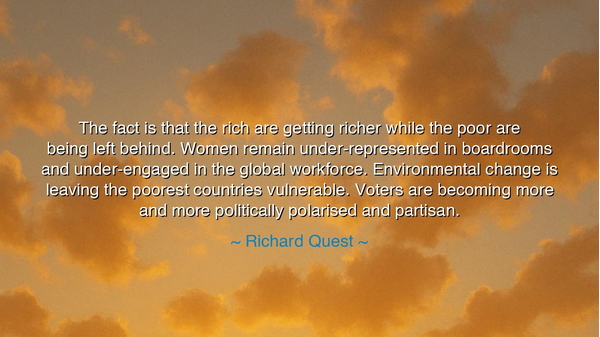
The fact is that the rich are getting richer while the poor are
The fact is that the rich are getting richer while the poor are being left behind. Women remain under-represented in boardrooms and under-engaged in the global workforce. Environmental change is leaving the poorest countries vulnerable. Voters are becoming more and more politically polarised and partisan.






The words of Richard Quest echo like a lament carried across the centuries: “The rich are getting richer while the poor are being left behind. Women remain under-represented in boardrooms and under-engaged in the global workforce. Environmental change is leaving the poorest countries vulnerable. Voters are becoming more and more politically polarised and partisan.” This is not merely a description of our age—it is a mirror of civilization itself. From the dawn of empires to the glare of neon cities, humanity has always walked the knife’s edge between prosperity and inequality, power and exclusion, progress and destruction. In these few sentences, Quest compresses the sorrow and imbalance of a world spinning too fast for its own soul.
In every era, the rich and powerful have found ways to fortify their towers while the multitudes below struggle for bread. In Rome, the patricians feasted while plebeians starved beneath marble arches. In the Industrial Revolution, coal barons amassed fortunes while workers coughed black dust into the night. Today, the same chasm widens—its form digital, its reach global, its cruelty more invisible. The tools may change, but the truth remains: wealth concentrates, and those without power drift further into the shadows. When the poor are left behind, it is not only their suffering we ignore, but the moral decay that creeps silently through every society that forgets its weakest.
And what of women, the other half of the world’s strength, too often denied their rightful place at the table of power? From the days when queens were hidden behind curtains to the modern boardrooms where their voices still echo faintly, the story remains incomplete. Yet history reminds us that when women rise, nations flourish. When Empress Wu Zetian ruled China, literature and administration bloomed. When Marie Curie pursued her discoveries, the world’s knowledge deepened. When Malala Yousafzai raised her voice for education, entire generations found courage. Quest’s lament is not just statistical—it is spiritual. To deny women full participation is to dim half the light of humanity itself.
Then comes the earth—the environment, wounded by the greed of men who mistake dominion for ownership. Quest warns that environmental change punishes not the powerful who cause it, but the poor who cannot escape it. In Bangladesh, rising seas consume villages; in the Sahel, drought chokes the soil; in island nations, children learn the word “migration” before they learn “home.” Once, the earth was sacred, and the ancients gave thanks before cutting a tree or drinking from a river. Now, we strip the forests bare and call it progress. But the old wisdom whispers still: what we do to the land, we do to ourselves.
Even the realm of the spirit is not spared. Political polarization spreads like a fever, turning brother against brother and nation against nation. Where once dialogue built bridges, now outrage builds walls. In ancient Athens, democracy died not by conquest but by division—citizens who forgot that their shared destiny outweighed their personal pride. So too today, when truth bends under the weight of faction and fear. Quest’s words remind us that when we stop listening, we stop being one people. The heart of a civilization does not beat through wealth or armies, but through the harmony of its citizens’ compassion.
Consider the lesson of Nelson Mandela, who, after twenty-seven years in prison, did not seek vengeance but unity. His vision rose above bitterness, transforming a nation from apartheid to reconciliation. He understood that true progress is not built on walls or wars, but on empathy and justice. The same truth applies to our time: we cannot heal inequality with silence, nor the planet with denial, nor politics with hate.
Thus, let every reader take heed: balance is the soul of civilization. When one group soars while another falls, the structure trembles. When power forgets mercy, when wealth forgets generosity, when humanity forgets its shared breath—then collapse is near. The ancients knew that empires fall not by invasion but by arrogance. The cure is not despair, but action born of conscience: educate the forgotten, empower the women, restore the earth, and listen across divides.
In the end, Quest’s warning is a prophecy and a plea. It tells us that inequality, exclusion, and division are not the signs of progress, but the shadows of decline. Yet within every shadow lies the shape of light. If we choose to act with compassion, with courage, and with collective purpose, we may yet rewrite the fate of our age. For though the rich may rise and the poor may fall, only a just humanity endures.






AAdministratorAdministrator
Welcome, honored guests. Please leave a comment, we will respond soon